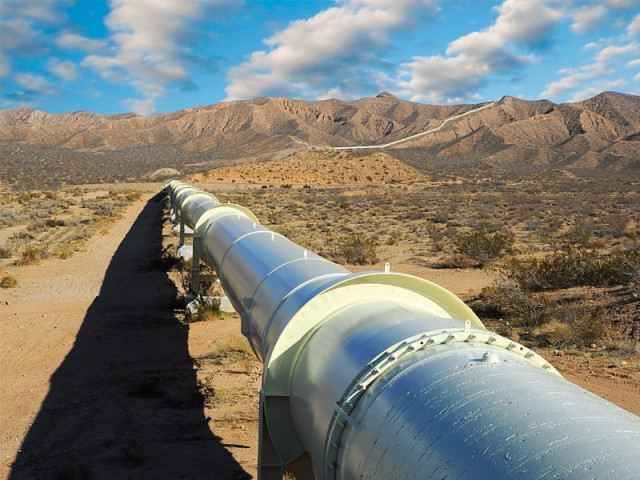TAPI pipeline: ECC likely to allow hiring of ADB as transaction adviser
To consider gas supply to Engro’s new fertiliser plant at concessionary rates.

According to sources, the three other countries that are part of the project have already given their consent in writing, agreeing on hiring the ADB as a transaction adviser to help generate over $7.5 billion. PHOTO: FILE
It will be a significant development at a time when Pakistani officials are in the United States to discuss a financing deal with US energy firms for the project, called Turkmenistan, Afghanistan, Pakistan and India (TAPI) pipeline.
The US has been pushing for laying the pipeline in a bid to win big extraction contracts in Turkmenistan for its companies, such as Chevron, and press Pakistan to abandon the Iran pipeline project.
Leading US-based oil companies, Chevron and ExxonMobil, have expressed interest in financing and constructing the TAPI pipeline. The Ministry of Petroleum and Natural Resources, which has prepared a summary, will ask the ECC to give the go-ahead to the award of contract to one of these firms against provision of funds. The ministry will also seek approval for signing an agreement with the ADB.

According to sources, the three other countries that are part of the project have already given their consent in writing, agreeing on hiring the ADB as a transaction adviser to help generate over $7.5 billion.
Each country will pay $5 million in fee to the ADB, which will deal with the company leading a consortium of financiers. Chevron has emerged as the potential leader of the consortium to finance, build and operate the pipeline.
The ADB has already warned that the pipeline cost could exceed $10 billion compared to earlier estimates of $7.5 billion because of delay in starting work on the venture.
All participating countries have signed a gas sale and purchase agreement with Turkmenistan for the import of gas.
On its part, Chevron has sought exploration rights in Turkmenistan as well as contracts in response to financing and running the project. However, Turkmenistan has offered exploration rights for offshore fields and asked Chevron to swap the gas found in these fields for onshore gas and then export it. Turkmenistan does not allow foreign companies to search for hydrocarbons in its onshore fields.
Under the TAPI project, Pakistan will get 1.365 billion cubic feet of gas per day (bcfd) from Turkmenistan, India will also receive the same 1.365 bcfd and Afghanistan will get 0.5 bcfd.
Gas for Engro fertiliser plant
The government is expected to give approval to the supply of gas to Engro’s new fertiliser plant at concessionary rates.
Though the previous PPP government had decided to divert 103 million cubic feet of gas per day (mmcfd) from Engro’s old plant to its new Enven plant, it did not accept the demand for setting the price at a sharply lower level at 70 cents against $3.3 per million British thermal units (mmbtu). The ECC will on Wednesday consider the proposal to supply gas at a discount.
Enven plant, located in Deharki, Sindh, is the world’s largest single-train, ammonia-urea plant with a production capacity of 1.3 million tons per annum.
Engro, the food and fertiliser giant, has been receiving 103 mmcfd from the Mari field at a rate of $3.3 per mmbtu. It now wants Sui Northern Gas Pipelines – the gas distributor – to apply concessionary rates in line with a contract for securing gas supply from the Qadirpur gas field at 70 cents per mmbtu.
Published in The Express Tribune, November 13th, 2013.
Like Business on Facebook, follow @TribuneBiz on Twitter to stay informed and join in the conversation.



















COMMENTS
Comments are moderated and generally will be posted if they are on-topic and not abusive.
For more information, please see our Comments FAQ